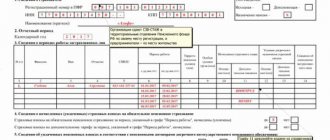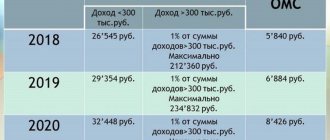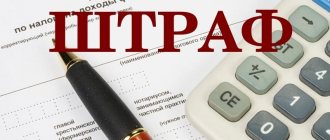OSS against accidents involves the provision of social protection and is aimed at ensuring measures to prevent and reduce injuries at work and occupational diseases.
Form 4-FSS - calculation of contributions to OSS from accidents in production activities and occupational diseases and the costs of paying such security, which has been used since the first quarter of 2020
Let's look at Form 4-FSS, which must be submitted in 2020; the need to submit zero reporting and the consequences are unfortunate.
Form 4-FSS
4-FSS contains a title page and tables:
| 1 | Calculation of the insurance premium base |
| 1.1 | Information for calculating premiums by policyholders |
| 2 | Calculations for OSS from industrial accidents and occupational diseases |
| 3 | Expenses for OSS from industrial accidents and occupational diseases |
| 4 | Number of victims and insured under this type of insurance |
| 5 | Information on the special assessment of working conditions (workplace certification) and medical examinations of workers |
| ★ Best-selling book “Accounting from scratch” for dummies (understand how to do accounting in 72 hours) > 8,000 books purchased |
On-site inspection of the FSS
The FSS has the right to independently conduct on-site inspections. Look at what the FSS checks in 2020, what are the regulations for interaction with tax authorities, what fines can be imposed on the company based on the results of the audit, and what is the procedure if you do not agree with its results.
What does the FSS check during an on-site inspection?
On-site inspections of the FSS are regulated by Federal Law No. 125-FZ dated July 24, 1998 and Federal Law No. 255-FZ dated December 29, 2006.
The FSS conducts 2 types of checks:
- Contributions for insurance against accidents at work and occupational diseases (“injuries”);
- Contributions in case of temporary disability and in connection with maternity (VNiM)
We have compiled for you a convenient table on the types of on-site inspections of the FSS, indicating what inspectors check. Check it out below.
Table. What does the FSS check during an on-site inspection?
| For contributions for injuries | 1. Are the contributions calculated correctly and paid in full and on time?2. Are the expenses for payment of insurance coverage carried out correctly? | 1. Inclusion in the FSS2 on-site inspection plan. Liquidation or reorganization |
| By contributions to VNiM | For periods from January 1, 2020: Are the expenses for payment of insurance coverage carried out correctly? | 1. Simultaneously with an on-site tax audit, upon receipt of information from the tax office about the costs of paying insurance coverage2. When applying to the Social Insurance Fund for insurance compensation payments3. Upon receipt of a complaint from an insured person (individual) about a refusal to pay or an incorrect amount of insurance payment |
| For periods before January 1, 2020:1. Are insurance premiums calculated correctly, paid in full and on time?2. Are the expenses for payment of insurance coverage carried out correctly? | 1. Inclusion in the inspection plan jointly with the Pension Fund2. Liquidation or reorganization |
What on-site inspections has the FSS conducted since January 1, 2020?
Let us remind you that from this year, contributions to the Social Insurance Fund are paid only in part of the contributions for injuries, the remaining contributions are paid to the tax office. In this regard, from January 1 of this year, changes took place regarding the conduct of on-site inspections.
So, from January 1, 2020, the FSS has the right to carry out the following on-site inspections:
- Checking the correctness of calculation, timeliness and completeness of payment of insurance premiums for the period before January 1, 2020.
- Unscheduled on-site inspections based on a complaint from an individual that insurance coverage has not been paid or was paid incorrectly, i.e. VNIM allowance (checks will be carried out only regarding the costs of this allowance).
- Scheduled on-site inspections together with tax authorities. The FSS checks the correctness of the company's expenses for benefit payments (VNiM).
- On-site inspections of contributions for injuries.
More information about the interaction between the FSS and the Federal Tax Service since 2020 can be found in the memo “Interaction of the policyholder with the FSS of the Russian Federation and the Federal Tax Service of Russia on legal relations that arose before December 31 and from January 1, 2017” posted on the official website of the FSS of the Russian Federation.
Fines based on the results of an on-site inspection by the FSS
Depending on what the FSS checks as part of an on-site inspection, the company may be subject to 2 types of fines:
1. The Federal Social Insurance Fund of the Russian Federation checked the correctness of payment of contributions for injuries and identified a violation (for example, it did not accept expenses). Prosecution is carried out by the FSS in the form of a fine in the amount of 20% of the unpaid amount and 40% if the actions were carried out intentionally.
2. As part of a joint on-site audit with tax authorities, the FSS did not take into account the costs of paying benefits (VNiM), which means that arrears in contributions arose. In this case, the FSS informs the tax office about this and the tax office holds the company accountable. The fine in this case is 20% of the unpaid amount of contributions and 40% if the action was carried out intentionally.
Objections to the on-site inspection report of the FSS of Russia
The results of a joint on-site audit with the tax authorities will be documented in a report drawn up by the tax authorities. In this article we will consider the procedure for objecting to the FSS on-site inspection report on contributions for injuries.
Please note that currently the forms of the on-site inspection report, as well as the requirements for issuing an on-site inspection report, are approved. by order of the FSS of the Russian Federation dated January 25, 2017 No. 9. If you received an act that does not meet these requirements, then this is a reason to appeal it and recognize it as drawn up in violation of the requirements of the law.
We have compiled a detailed table on the timing and procedure for actions based on the results of an on-site inspection of the Social Insurance Fund regarding contributions for injuries. Check it out below.
Download this spreadsheet so you don't forget important deadlines.
Download the Procedure based on the results of an on-site inspection by the FSS of the Russian Federation >>>
Table. Procedure based on the results of an on-site inspection by the FSS of the Russian Federation
| Drawing up a certificate of inspection | On the last day of the on-site tax audit |
| Drawing up an on-site inspection report of the FSS of the Russian Federation | Within 2 months from the date of preparation of the certificate |
| Delivery to a representative of the company being inspected | Within 5 days from the date of signing the act by the boss (in person against signature, by mail or by TKS) |
| Filing an objection (in case of disagreement) | 15 days from the date of receipt of the act |
| Consideration of written objections | Within 10 days from the date of expiration of the deadline for filing objections. The period can be extended by no more than a month |
| Making a decision based on the results of consideration of objections | Delivered to a company representative within 5 days after the decision is made (in person against signature, by mail or TKS) |
If you do not agree with the results of the inspection, draw up an objection to the act and submit it to your territorial FSS office. See an example of an objection.
Source: https://www.RNK.ru/article/215522-vyezdnaya-proverka-fss
Submission of form 4-FSS
All policyholders are required to submit completed: title page, tables 1, 2 and 5 of form 4-FSS, and tables 1.1, 3 and 4 of form in the absence of information are not filled out and not submitted.
Deadlines for submitting 4-FSS:
- printed form (for up to 25 employees) – by the 20th day of the month following the reporting month
- in electronic form with an enhanced electronic signature (if the number of employees is over 25 people and newly organized) - until the 25th day of the month following the reporting one
The deadline for submitting 4-FSS is extended if the due date falls on a weekend, and it can be submitted on the next working day.
Important! The average headcount is calculated according to the rules approved by Rosstat for filling out reports P-1, P-2, P-3, P-4, P-5(m). This order must be used to calculate 4-FSS.
Who takes SZV-TD
From January 1, 2020, all enterprises will begin to send a monthly report to the Pension Fund of Russia - in the SZV-TD form.
This form is a report sent to the Pension Fund of the Russian Federation on employed and expelled persons, as well as on personnel movements of workers (for example, transfer to another job or assignment of another qualification). It should be noted that financial penalties for failure to report to the Federal Tax Service are a nightmare for any chief accountant or boss. Fines for disrupting the SZV-TD report in 2020 were voted on by the State Duma only in the third reading.
The obligation to send information to the Pension Fund of Russia in the form SZV-TD falls on all enterprises and individual entrepreneurs, regardless of the number of personnel, even if only one individual is employed.
The SZV-TD form is filled out and submitted to the territorial office of the Pension Fund of the Russian Federation (clause 1.4 of the order of the Pension Fund of the Russian Federation No. 730p dated December 25, 2019).
Government departments also provide this report by category of employed persons, in accordance with paragraph. 3 clause 2.6 art. 11 of Law No. 27-FZ of 04/01/1996 “On personal accounting ... insurance”.
The head of the enterprise decides who to submit this report to - an accountant or a personnel officer, by appointing the person responsible by his order.
( Video : “Submission of reports to the FSS (Social Insurance Fund)”)
Due to the transition from 1.01. 2020 on electronic work books, reporting can be transmitted as follows:
- An employer with 25 or more employees is required to transmit data electronically, for example, using an electronic document management operator.
- If the number of employed personnel is less than 25 people, it is allowed to send SZV-TD reports on paper.
Submission of electronic reporting SZV-TD is carried out in accordance with Appendix 3 of PFR Order No. 730p, confirmed by an electronic signature, in accordance with Law No. 63-FZ of 04/06/2011 “On Electronic Signatures”.
When sending SZV-TD reports for the first time, all data on employees as of January 1 is displayed. 2020 in the institution (subclause 1, clause 2.5, article 11 of Law No. 27-FZ of 04/01/1996).
The report displays information about:
- Employment of a new employee.
- Dismissal of an employee.
- Moving to another position.
- Acquisition by a working person of a new profession or advanced training.
- Deprivation of an employee's right to hold certain positions based on a court verdict.
- An employee submits a petition to choose a method for recording his work record book.
- About renaming the enterprise.
The report is also sent to part-time employees.
For failure to send the report on time, the head of the enterprise may be given a warning or a financial penalty of 300-500 rubles.
In the future, there is a draft amendment to the Code of Administrative Offenses of the Russian Federation, according to which it is proposed to increase this fine to 5,000 rubles.
( Video : “Deadlines for submitting reports to the Pension Fund and the Social Insurance Fund”)
Penalty for failure to submit a declaration to the Social Insurance Fund
For failure to declare a tax return, the tax service may:
- Assign a financial penalty to the institution.
- Seize the institution's bank accounts.
In this case, it does not matter whether the institution is a tax payer or not.
This department has the right to impose a fine for failure to submit a declaration on any institution that is obliged to submit a report (paragraph 2, paragraph 5, article 174 of the Tax Code).
According to the established procedure, failure to submit reports to the Federal Tax Service (calculation of insurance payments or declarations) is subject to punishment in the form of a financial penalty in the amount of 5% of the tax payment displayed for transfer in the “overdue” declaration and not credited to the state budget before the approved date, for each overdue month, but not higher than 30% of the arrears and not lower than 1000 rubles (clause 1 of article 119 of the Tax Code of the Russian Federation).
However, there is an exception to every rule. Thus, for failure to report 6-NDFL, the institution will need to transfer a financial penalty in the amount of 1000 rubles for each overdue month (clause 1.2 of Article 126 of the Tax Code of the Russian Federation).
It should be noted that in order to calculate the amount of the financial penalty for failure to report on insurance payments, the Federal Tax Service employees take into account the debt on the 30th day of the month following the reporting period, i.e. on the date that is the last for sending reports (Explanation of the Federal Tax Service No. GD-4-11 / [email protected] dated 09.11.2017).
In addition to imposing a financial penalty for failure to declare a declaration, the tax department may seize the institution’s bank accounts if the declaration is not submitted within 10 working days after missing the date of its sending (clause 3 of article 76, clause 6 of article 6.1 of the Tax Code of the Russian Federation).
Note: If the date of sending the report falls on a weekend, then the report is sent on the first day of operation of the enterprise (Clause 7, Article 6.1 of the Tax Code of the Russian Federation).
In addition to the penalties imposed on the institution for failure to report, they can issue a penalty to the head of the institution or the chief accountant, equal to 300 to 500 rubles.
Checking the submitted 4-FSS
The control procedure is carried out through desk and on-site inspections.
A desk audit is carried out at the location of the FSS on the basis of the submitted calculations and other information available to the FSS. The inspection is carried out by authorized persons in accordance with their official duties within 3 months from the date of submission of the 4-FSS without a special decision from the head of the FSS. If errors in calculations and inconsistencies in information in documents are identified during the inspection, the policyholder is informed with a requirement to provide explanations or corrections within 5 days.
An on-site inspection is carried out on the territory of the person being inspected, which requires a decision from the head of the Social Insurance Fund, provided that inspections are carried out more often than once every 3 years (excluding inspections of its separate divisions). During an on-site inspection, a period of no more than 3 years prior to the year in which the inspection decision was made is verified. The maximum duration of an on-site inspection is no more than 2 months, but this period can be extended to 4 or 6 months if there are such grounds:
obtaining during the inspection from any sources data indicating the presence of violations
- presence of force majeure in the territory of the inspection
- presence of several separate divisions
- failure to submit documents within the established period for an on-site inspection
The person in respect of whom the inspection was carried out, in case of disagreement with the facts set out in the inspection report and with the conclusions and proposals of the inspectors, within the prescribed period, may submit written objections, attaching documents (their copies, certified in the prescribed manner) confirming the validity of his position .
Expert of the Legal Consulting Service GARANT O. Volkova
4-FSS was not submitted on time - what is the way to avoid a fine?
Even if the payment is not submitted or submitted on time, the fine can be avoided, its size can be reduced, or an installment plan (deferment) in payment can be obtained. Art. talks about this. 26.2 and art. 26.25 of Law No. 125-FZ. To exercise these rights, the policyholder must submit a corresponding application to the territorial branch of the Social Insurance Fund where he is registered. Circumstances that positively influence the outcome of the case may include:
- on an installment plan (deferment), the period of which should not exceed 1 year: the influence of force majeure circumstances, the seasonal nature of the work, untimely payment of budget allocations to the policyholder - the recipient of budget funds;
- to reduce (cancel) the fine: natural disasters, illness of an official, compliance by the insured with the insurer’s instructions.
Penalty for failure to report
A fine for failure to submit 4-FSS is issued to organizations or individual entrepreneurs that pay contributions for insurance against accidents and occupational diseases.
The late report begins on the day following the last day of the deadline for submitting 4-FSS.
Failure to submit 4-FSS on time may result in a fine of 5% of the amount of contributions accrued for payment for the previous 3 months for each full or partial month from the date of reporting, but not more than 30% of the specified amount, but not less than 1000 rubles .
Drawing up a 4-FSS that does not comply with the presentation procedure may result in a fine of 200 rubles.
At the same time, a fine for failure to submit 4-FSS can also be issued to an official (manager) and will amount to 300 - 500 rubles.
For refusal to provide documents to confirm the correctness of the calculation and for missing the deadline for their provision, the fine is 200 rubles. for each document not submitted, and for officials 300 - 500 rubles.
To avoid being fined for late submission of 4-FSS, you need to submit this report on time.
Penalty for failure to submit reports to the Funds
All institutions and individual entrepreneurs are required to promptly send reports to the Federal Tax Service/FSS/PFR, and the data must be submitted on approved unified forms.
If you provide a report on a form that does not have a valid status, such a declaration will not be accepted, with the corresponding penalties (clause 1 of Article 119 of the Tax Code of the Russian Federation, clause 1, 1.2 of Article 126 of the Tax Code of the Russian Federation, clause 1 of Article 26.30 of Law No. 125-FZ of July 24, 1998, Article 17 of Law No. 27-FZ of April 1, 1996). Based on the above, if the declaration to Social Security under f. 4-FSS, the institution will be punished with a financial penalty equal to 5% of the amount of debt accrued during the reporting period for each overdue month, but not more than 30% of the amount of arrears and not less than 1000 rubles. (Clause 1, Article 26.30 of Law No. 125-FZ of July 24, 1998).
The same fate awaits an institution that has not sent a declaration under f. to the Pension Fund. RSV-1 for the past time until 01/01/2017 (Part 1, Article 46 of Law No. 212-FZ dated 07/24/2009 (as amended, valid until 01/01/2017), Article 20 of Law No. 250-FZ dated 07/03. 2016).
Regarding the failure of the declaration under f. SZV-M, as well as other reports to the Pension Fund of the Russian Federation on personnel, if the deadlines for sending declarations are ignored, a penalty of 500 rubles is imposed for an employee for whom an obligation to provide data arises (Article 17 of Law No. 27-FZ of 04/01/1996).
Is it possible to reduce the amount of the fine for failure to submit reports?
The management of the institution can apply to the regulatory structures to reduce the amount of the financial penalty if it provides mitigating arguments (clause 1 of Article 112 of the Tax Code of the Russian Federation, clause 1 of Article 26.26 of Law No. 125-FZ of July 24, 1998).
For example, one of the mitigating arguments can be given by the fact that the failure to report was committed by the taxpayer for the first time (Order AS DO No. F03-447/2016 dated 03/02/2016).
An example of calculating a fine for late submission of 4-FSS
The organization submits reports in electronic form. 4-FSS for the 2nd quarter of 2020 was sent on August 10. The amount of contributions for 3 months is 50,000 rubles. The deadline for sending the report for the 2nd quarter is July 25. The delay is counted from July 26 and is 15 days. Fine for 1 month:
50000 * 5% = 2500 rub.
For one incomplete month, the fine is 2,500 rubles.
If the untimely submitted 4-FSS was zero, then the fine would be the minimum amount - 1000 rubles.
If the delay is longer, the maximum possible fine will be imposed.
50,000 * 30% = 15,000 rub.
Such fines are issued for a one-time violation of the deadline for submitting 4-FSS. If there is a constant delay, this can be framed as an aggravating circumstance and for subsequent delays the fines are doubled.
Results
A fine for failure to submit zero reporting on time in Form 4-FSS is imposed on enterprises and individual entrepreneurs with employees in the amount of 1,000 rubles.
The fine imposed on the official may range from 300 to 500 rubles. However, fines may be reduced or canceled if the policyholder presents a statement and evidence of valid reasons specified in Law No. 125-FZ for his act. You can find more complete information on the topic in ConsultantPlus. Full and free access to the system for 2 days.
Removal of the obligation to pass 4-FSS zero
Organizations, their separate divisions, and individual entrepreneurs are required to submit reports as long as they are registered with the Social Insurance Fund. There are situations when the entire staff is on administrative leave or dismissed, or operations have been stopped, but the obligation to report remains through the submission of zero 4-FSS. In order not to submit a calculation, you can submit an application for deregistration as an insured, and a separate division has the right to transfer such a function to the parent organization.
Providing the register to the FSS
the employee turned in sick leave, and we missed the deadline (5 days) for submitting the register to the Social Insurance Fund (we are participants in the pilot project). What should we do? And clause 14 of Resolution No. 294 states that if the deadline is missed, then the register will not be provided again at all. This is a deadline - 5 days - within which we must submit, and we are 20 days late, will there be any fine and in what size?
Lidia Merkutova answers,
expert
You misunderstood paragraph 14 of Resolution No. 294.
We are talking about the deadline for applying for benefits of the insured person.
Those. the employee has the right to apply for benefits within six months after the end of sick leave. If he applied later, then the register is not provided at all.
If six months have not expired since the closure of the sick leave, provide the register, this is legal.
To avoid a fine, set the date for receiving documents from the employee within five calendar days from the date the register was sent.
We recommend reading: How to draw up work in accordance with the technical specifications
Otherwise, administrative liability is a fine in the amount of 300 to 500 rubles.
Answers to common questions
Question #1 : What fine can be imposed if dues are not paid?
Answer : If the premiums are calculated correctly, but their payment is delayed, then no penalty will be applied to the policyholder. And for late transfer of correctly calculated contributions, penalties will be charged.
Question No. 2 : What to do if the software for passing the 4-FSS is not compatible with the operating system?
Answer : The requirements for 4-FSS are reflected in electronic form in order No. 83 dated March 09, 2020. These requirements are taken into account by the software development specialist to fill out the calculation and apply the current versions of the relevant software.
Error when calculating the fine
The most common mistake in 4-FSS is the incorrectly calculated amount of contributions and penalties are applied only if they are underestimated. The fine will be:
20% of the underpaid amount under normal conditions
40% of the underpaid amount, if the FSS can prove the presence of malicious intent.
If the policyholder managed to make corrections regarding accruals and payment of amounts in the submitted report before the deadline for submitting the report, then he can do without a fine.
All employers who are recognized as insurers must submit reports on contributions and payments related to occupational diseases and industrial accidents in Form 4-FSS.
If, when submitting 4-FSS, the employer does not comply with the deadlines established by law, then he will have to pay a fine for late submission of the report.
Zero reporting to the Social Insurance Fund: deadlines, fines, sample
Zero reporting is a package of accounting documents that is submitted to state regulatory authorities in the absence of activity of the organization. Conditions of inactivity can be caused by various reasons:
- The company was registered relatively recently and has not yet begun professional activities.
- Business activities were temporarily suspended. Quite often, a similar reason can be found among organizations engaged in seasonal work.
- Termination of professional activity. In such cases, all signs of entrepreneurial activity must be absent: the company must stop buying and selling goods and services. Organizations that purchase and do not sell goods are not obliged to submit zero reports.
Financial sanctions for violating social legislation
After all, these are the amounts that must be paid based on the calculation.
By the way, the same rule applies when calculating the fine for late submission of tax returns (Letter of the Ministry of Finance of Russia dated February 10, 2009 N 03-02-07/1-59; Resolution of the Federal Antimonopoly Service of the North-West District dated March 12, 2009 in case N A21-7367/2008; FAS UO dated 01/21/2009 N F09-10346/08-S2, dated 09/08/2008 N F09-6390/08-S2).
Rule 2. The balance of settlements with the Social Insurance Fund should not affect the amount of the fine . Otherwise, it will turn out that it is enough to pay all contributions to the FSS on time - and the fines for late submission of Form-4 to the FSS of the Russian Federation will be minimal - 100 rubles. for each type of insurance (if the delay is less than 181 days). And this contradicts the very principle of the fine - after all, it is levied for late submission of the calculation, and not for non-payment of contributions.
Note
This principle underlies the fine for late submission (failure to submit) tax reporting under Art. 119 of the Tax Code of the Russian Federation. In tax returns, the indicators in the lines “amount of tax payable...” never take into account the amounts of the transferred payments. This means that the state of tax calculations at the beginning and end of the reporting (tax) period does not affect this fine.
Therefore, when calculating fines for late submission of calculations, you cannot rely on the indicators of line 19 “Debt owed by the policyholder at the end of the reporting (settlement) period)” of table 1, section. I and line 14 “Debt due to the policyholder at the end of the reporting period)” of table 10 section. III form-4 FSS of the Russian Federation.
Attention! Timely payment of insurance premiums will not reduce the fine for late submission of Form-4 to the FSS of the Russian Federation (Clause 13 of the Information Letter of the Presidium of the Supreme Arbitration Court of the Russian Federation dated March 17, 2003 N 71).
Now let’s look at the approaches that can be used to determine the amount of contributions “to be paid (additional payment)” according to Form-4 of the Federal Social Insurance Fund of the Russian Federation.
Approach 1. The amount of contributions payable (additional payment) is the difference between the amount of contributions accrued for the reporting quarter and the amount of your expenses for state insurance purposes for this period
For example, if the amount of accrued contributions for a quarter is 30,000 rubles, and the amount of accrued benefits (sick leave) is 12,000 rubles, then the fine will be calculated from the amount of 18,000 rubles.
However, in Form-4 of the FSS of the Russian Federation there is no separate line in which you can see the required amount. It will have to be calculated like this:
— for insurance premiums for “hospital” insurance — we take the indicator of the subrow “for the reporting quarter (months)” of line 2 “Insurance premiums accrued” of table 1 section. I and subtract from it the indicator of a similar subline “for the reporting quarter (months)” of line 15 “Expenditures for the purposes of compulsory social insurance” of table 1 section. I;
- for insurance premiums “for injuries” - similarly: we take the indicator of the subrow “for the reporting quarter (months)” of line 2 “Insurance premiums accrued” of table 10 section. III and subtract from it the indicator of a similar substring in line 10 “Expenses for compulsory social insurance” of table 10, section. III.
This approach is quite logical and fair. After all, it is the amount of contributions that you must pay to the Social Insurance Fund at the end of the quarter that the Fund’s branch should find out from the Form-4 of the Social Insurance Fund of the Russian Federation that you submitted untimely.
It turns out that if your expenses for social insurance are more than the accrued contributions, then the fines for late submission of Form-4 of the FSS of the Russian Federation should be minimal.
Approach 2. The amount of contributions to be paid (additional payment) is the amount of accrued contributions to the Social Insurance Fund for the reporting quarter. Without any reductions in the amount of accrued benefits
For example, if for the reporting quarter a total of 30,000 rubles was accrued, and benefits amounted to 12,000 rubles, then the fine for late submission of the calculation to the Social Insurance Fund will be calculated from the amount of 30,000 rubles. As can be seen with the naked eye, with this approach the amount of the fine may be greater than with the first approach. To calculate the base for a fine, you simply need to take the amount of accrued contributions from Form-4 of the Federal Social Insurance Fund of the Russian Federation:
— for insurance premiums for “hospital” insurance — we take the indicator of the subrow “for the reporting quarter (months)” of line 2 “Insurance premiums accrued” of table 1 section. I (that is, the amount of contributions accrued for the last quarter);
- for insurance premiums “for injuries” - similarly: we take the indicator of the subrow “for the reporting quarter (months)” of line 2 “Insurance premiums accrued” of table 10 section. III.
But with this approach, the amount of the fine will not be calculated from the amounts of contributions subject to payment or additional payment, as required by Law N 212-FZ and Law N 125-FZ (Clause 2.3 of the Constitutional Court of the Russian Federation of July 11, 2006 N 265-O; clause. 2.1 Definitions of the Constitutional Court of the Russian Federation dated December 16, 2008 N 1069-О-О). The fine will be calculated from the amount of assessed contributions.
By the way, this is exactly the approach supported by the Social Insurance Fund.
From authoritative sources
Olga Viktorovna Denisevich, Head of the Department for Improving Legislation in the Field of Compulsory Social Insurance of the Department of Legal Support of Social Insurance of the Federal Social Insurance Fund of the Russian Federation
“In case of untimely submission of a calculation in accordance with Form-4 of the Federal Social Insurance Fund of the Russian Federation, the fine will be calculated from the amount of accrued insurance premiums for 3 months of the last quarter - without taking into account expenses for social insurance purposes. For example, if 10,000 rubles are credited every month. contributions, the fine will be calculated from the amount of 30,000 rubles. (RUB 10,000 x 3 months).
This applies to the calculation of both fines:
- for late submission of reports on insurance premiums in case of temporary disability and in connection with maternity;
- for failure to submit reports on compulsory social insurance against accidents and occupational diseases within the prescribed period.”
* * *
If your FSS branch fines you based only on the accrued amounts of contributions, you will certainly be able to challenge this in court. But is it worth bringing the matter to a fine? It is better to avoid delays in submitting reports altogether. And there is one simple move for this. If you understand that you do not have time to draw up “correct” reports on time, submit at least an “approximate” report to the Social Insurance Fund, but on time. And then submit a clarification to the Fund. The main thing, as when submitting updated tax returns, is to do this before the Fund finds an error in your calculation or orders an audit (Article 17 of Law No. 212-FZ).
Tax liability, Insurance premiums, Tax reporting
How is the fine for a failure to submit a report to the Social Insurance Fund calculated: example
I sent a paper calculation, let’s say, on May 24, 2020. The form contains the following numbers:
- contributions to the Social Insurance Fund for January 2017 - 55,000 rubles.
- for accrual for February. 17 – 58,000 rub.
- The amount of contributions for March is 44,000 rubles.
The company employs 5 people, therefore the deadline for submitting the form expired on April 20.
The fine for late submission of the report will be 15,700 rubles ((55,000 + 58,000 + 44,000)*5%)* 2 months.
IMPORTANT: when transferring the fine, pay attention to the nuances of filling out the payment order, otherwise the payment will go to the wrong cash register.
Fine for violating the 4-FSS filing form in 2020
Federal Law No. 125-FZ requires companies with more than 25 employees to submit 4-FSS electronically. For companies with fewer employees, there is a choice: electronically or on paper. What happens if you violate this regulation?
For an enterprise with a small number of employees, nothing, because for them any form is acceptable. The main thing is not to be late with deadlines.
For large enterprises, violations will result in trouble. 4-FSS on paper, of course, will be taken from them, but they will have to pay penalties - 200 rubles.
The chief accountant or other responsible person will be fined 300-500 rubles.
Computer submission of reports requires an electronic signature.
Report submission deadlines
Depending on the characteristics of the organization, the deadlines within which zero reporting must be submitted change.
For example, an enterprise paying VAT undertakes to submit a zero declaration no later than the 25th day of the month following the reporting period. A legal entity using a simplified taxation system reports annually until the end of March.
Other reporting forms are submitted within the following deadlines:
Confused about how to fill out documents? Don't worry, we will do the 3-NDFL declaration or zero reporting for you .
- NFDL. Until the end of March;
- Income taxes. Until March 28 of the year following the reporting year;
- Average number of employees. No later than January 20 of the current year;
- Property taxes. Until March 30 of the year following the reporting period;
- Transport taxes.
Under what law and how are policyholders held liable?
As noted above, Art. 119 of the Tax Code of the Russian Federation is more humane in relation to organizations than Art. 19 of Federal Law N 125-FZ. In this regard, many policyholders, realizing that they have committed an offense, make an attempt to answer specifically under the Tax Code. The formal basis for this is contained in Art. 19, according to which the insurer holds the insured liable in a manner similar to the procedure established by the Tax Code of the Russian Federation for holding liable for tax offenses.
However, despite this seemingly saving norm for policyholders, we are forced to admit that attempts to bear liability under Art. 119 of the Tax Code of the Russian Federation, unfortunately, are doomed to failure. The fact is that Law No. 125-FZ refers to the norms of the Tax Code of the Russian Federation only for the purpose of determining the procedure for bringing to responsibility, and not establishing the size of the sanction.
The applicant's reference to the need to apply clause 2 of Art. to these legal relations. 119 of the Tax Code of the Russian Federation is not taken into account by the court of cassation, - this was the conclusion made by the FAS DO in Resolution No. F03-A73/06-2/3387 of October 11, 2006. The court motivated this decision as follows: in Art. 2 of Federal Law N 125-FZ states that the legislation of the Russian Federation on compulsory social insurance against industrial accidents and occupational diseases is based on the Constitution of the Russian Federation and consists of this Federal Law, federal laws adopted in accordance with it and other regulatory legal acts of the Russian Federation Federation.
Thus, the above-mentioned Federal Law is special and regulates the legal relations of the policyholder, insurer and insured person, while the norms of the Tax Code of the Russian Federation are not related to special legislation on the payment of insurance premiums for compulsory social insurance against accidents at work.
Link in art. 19 of Federal Law N 125-FZ on bringing the insured to liability by the insurer in a manner similar to the procedure established by the Tax Code of the Russian Federation for bringing to liability for tax offenses, does not mean the possibility of applying other norms of the Tax Code of the Russian Federation to relations on compulsory social insurance without a special purpose for that instructions in the relevant legislative acts.
Thus, a reference to the procedure for holding the policyholder liable established in the Tax Code will not allow him to reduce penalties to the amounts provided for in Art. 119 of the Tax Code of the Russian Federation. However, this rule can still be of good service to the policyholder. The fact is that when an offense is detected as a result of tax control, the FSS is obliged to comply with the general procedure for bringing the taxpayer (fee payer or tax agent) to tax liability.
The subject of consideration by the Federal Antimonopoly Service of Moscow Region was the case of holding the policyholder liable for failure to submit reports on time. The organization did not submit a payroll statement for the fourth quarter of 2004 until January 15, 2005, and again for the first quarter of 2005.
Zero 4-FSS (reporting in 2020): to submit or not
Let's start with the most pressing question: do I need to take the 4-FSS zero? Yes, you will have to submit reports in any case, even if the activity has not yet begun, is suspended or has already been terminated. Legislators did not provide any exemptions.
Is it necessary to submit a zero 4-FSS report for individual entrepreneurs without employees? No, an individual entrepreneur working without hired employees is not required to take the 4-FSS in 2020 (zero form).
Therefore, if an economic entity has employees on its staff, then there is no need to worry about whether you need to pass the zero 4-FSS 2020. Submit the report, even if wages were not accrued in the billing period, contributions were not calculated or paid to the Social Insurance Fund.











